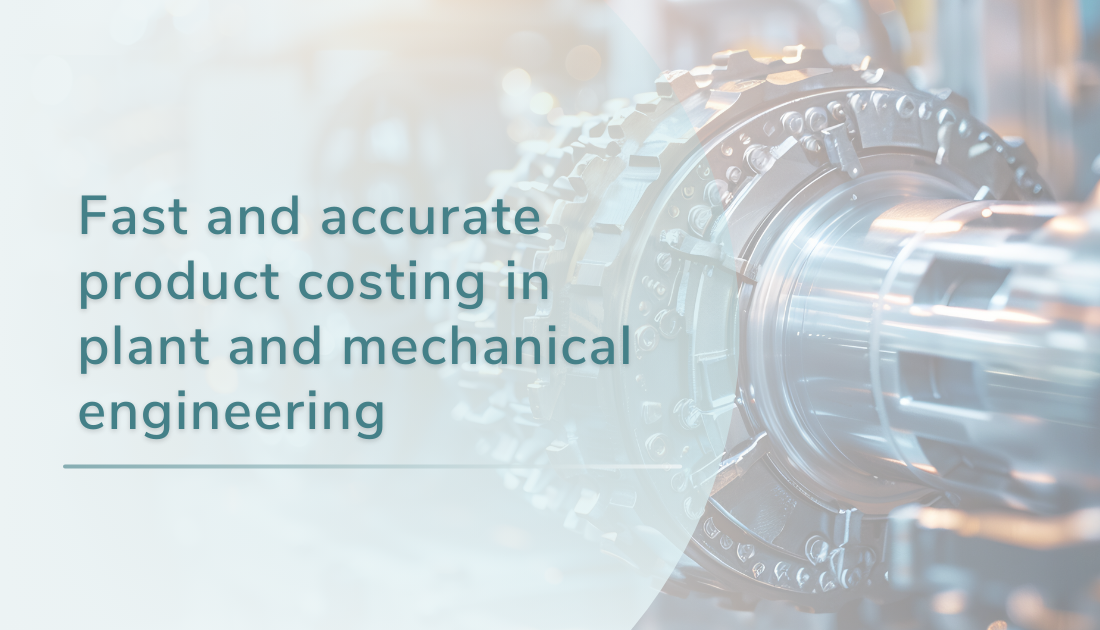"Quality has its price!" was once a phrase German mechanical engineering and plant construction companies could rely on. The "Made in Germany" label helped justify premium pricing. But this confidence has eroded as global competition intensifies.
Germany remains a leading exporter of machinery, yet recent figures from the Federal Statistics Office illustrate a growing challenge. German machinery exports saw a 4.6% decrease in early 2024, a decline of 7% after accounting for price changes.
For manufacturers, this decline underscores a crucial shift: relying on heritage and reputation is not enough.
This article will explain how companies can get an exacting grasp of their production costs and stay competitive.
CONTENT
- Challenges in BOM Management and their costly consequences
- Detailed product cost analysis for greater product cost transparency
- Retaining knowledge for process time calculation and evaluation
- Easy management of variants - even for one-off products
- The benefits of calculation software for mechanical engineering and plant companies
- Streamline cost calculation with Enterprise Product Costing (EPC)
CHALLENGES IN BOM MANAGEMENT AND THEIR COSTLY CONSEQUENCES
In mechanical engineering and plant construction, products such as machine tools and wind turbines are key examples of how even the smallest components can significantly influence costs.
Although BOM are invaluable for accurate product costing, they are often underused. Several challenges contribute to this issue, including:
- Resource limitations: Many companies lack the tools or systems to handle BOM data effectively.
- Manual errors: Missing components or incorrect exports during data transfers, often caused by manual data entry and poor collaboration.
- Cost rollup difficulties: Determining precise costs for every component at the early stages of development is challenging. Companies defer this analysis until later when design finalization and part ordering make changes costlier or impossible.
These issues often lead companies to analyze only a small portion of a product’s components, resulting in missed potential cost optimizations.
The consequences of BOM errors
Relying on incomplete BOM or inaccurate estimates can lead to serious repercussions. For instance:
- Disrupted production caused by missing components.
- Costly delays and additional expenses due to regulatory or compliance issues.
- Liability and rework costs stemming from inaccurate or incomplete BOM data.
Often, companies estimate costs for new components using broad approximations based on experience or historical data rather than current cost information.
For example, a company might assume that doubling the size of a container (e.g., from 500 liters to 1,000 liters) doubles the cost. Yet this decision doesn’t account for scale efficiencies or design complexities. Such oversimplifications accumulate inaccuracies over time and can lead to severe cost miscalculations.
To avoid these pitfalls, companies must move away from approximations to ensure every component, from design through production, is properly accounted for.
DETAILED PRODUCT COST ANALYSIS FOR GREATER TRANSPARENCY
Modern costing solutions help companies break down product costs into components, creating a clear and transparent cost structure.
This approach allows for fast, manufacturer-specific calculations of production or manufacturing costs at the component level.
Product costing software provides:
- Centralized data access: Critical information such as location-dependent basic data, machine, wage and salary rates, and overhead costs are instantly accessible via a single database.
- Efficient search tools: Search filters and masks streamline navigation through vast volumes of data, improving accuracy and speed.
- Reusable search queries: Frequently used or complex queries can be saved, enabling repeated searches with a single click, significantly accelerating cost calculation processes.
Did you know?
Around 80% of a product’s total costs are determined during the development phase.
Focusing on cost control at this stage offers immense savings potential.
Using an EPC (Enterprise Product Costing) solution allows companies to stay competitive by identifying cost-saving opportunities early in the design phase.
RETAINING KNOWLEDGE FOR PROCESS TIME CALCULATION AND EVALUATION
In mechanical engineering and plant construction, safeguarding technical knowledge is essential to prevent costly disruptions caused by employee turnover or skill shortages.
Why retaining knowledge matters:
- Costly brain drain
Employee turnover and the growing need for specialists can cause a loss of irreplaceable expertise, known as "brain drain". This workforce is both expensive and difficult to recover. - Safeguarding technical knowledge
Retaining essential information, such as process time calculations, ensures that critical technical expertise stays within the company. - Personnel dependency
By embedding knowledge into systems or technology, businesses lower their reliance on specific employees, ensuring operational continuity and minimizing risks.
Modern costing solutions effectively tackle knowledge retention. They provide detailed overviews of manufacturing and assembly processes, including all the parameters needed for accurate cost calculations.
Businesses use these systems to evaluate manufacturing and other processes based on set parameters.
Companies can use freely programmable models to tailor the system to their needs. This allows them to store specialized processes in proprietary databases and safeguard critical knowledge.
EASY MANAGEMENT OF VARIANTS - EVEN FOR ONE-OFF PRODUCTS
Mechanical engineering and plant construction companies often deal with making unique, one-off products, which can be expensive.
To save costs, they use a modular system—reusing parts that can be combined in different ways to meet specific customer or regional needs. This approach helps them produce small batches or prototypes more affordably.
When these modules are mass-produced, the cost per unit decreases, reducing the overall cost of components.
However, managing all the different product variations requires a flexible and reliable system. This system allows them to quickly adjust calculations for new product requirements without losing or overwriting important data, ensuring everything stays accurate and secure.
THE BENEFITS OF CALCULATION SOFTWARE FOR MECHANICAL ENGINEERING AND PLANT COMPANIES
Cost management software provides significant advantages for mechanical engineering and plant construction companies. Key benefits include:
- Integrated bills of materials (BOM): It removes the need to start calculations from scratch, enabling faster customer-specific configurations such as drive or dimension variants. This also streamlines and simplifies the process of quotation calculations.
- Simplified sales processes: Sales teams can quickly calculate functional variants by selecting features from predefined lists. This eliminates reliance on cost specialists, significantly speeding up response times.
- Enhanced transparency and control: Tools for documenting and commenting on changes ensure a clear record of calculations. They allow users to track adjustments, identify who made updates, and understand the reasons behind them.
- Proactive cost management: Helps identify cost drivers early in development and explore alternatives like different manufacturing methods or locations.
- Lifecycle cost monitoring: Tracks expenses throughout the product lifecycle, ensuring projects remain profitable while meeting target margins.
- Advanced cost simulation: Analyzes surcharges, currency fluctuations, and expected fees to help businesses maintain profitability in shifting market conditions.
Discover our exclusive whitepapers
Calculate your product costs with precision. Rely on standardized processes for sustainable enterprise management.
📥 Download the "Enterprise Product Costing" whitepaper here
Enhance the accuracy of your quotes and reduce calculation times.
STREAMLINE COST CALCULATION WITH ENTERPRISE PRODUCT COSTING (EPC)
Enterprise Product Costing solutions simplify and standardize cost management across an organization by leveraging advanced software tools. Here's how EPC ensures consistent cost calculation:
Centralized cost data
- EPC consolidates all cost-related information into a single, centralized database.
- ERP, PLM, or CAD interfaces automatically update and manage data without manual intervention.
Time-saving automation
- Manual searches and data transfers are eliminated, saving valuable time.
- Automatic updates create a reliable and accurate body of data for all departments.
Standardized processes enterprise-wide
- All locations and departments follow the same standardized methods and processes for costing.
- This ensures consistent and accurate calculations using the most up-to-date data.
By integrating FACTON EPC software, companies not only improve efficiency but also ensure uniformity in cost management across all operations.
Talk to our experts today!



